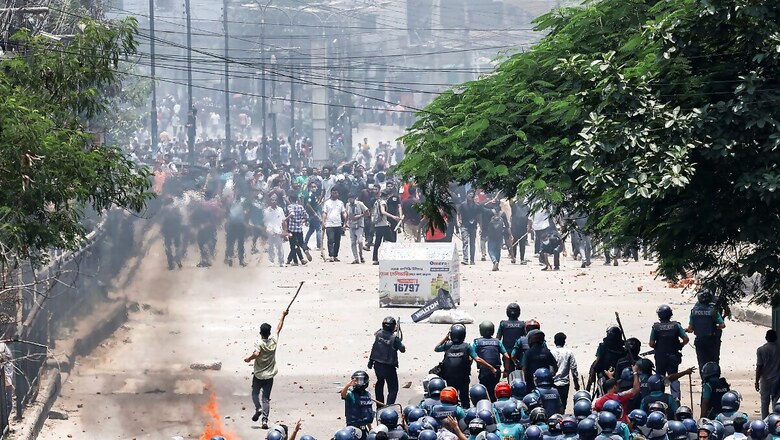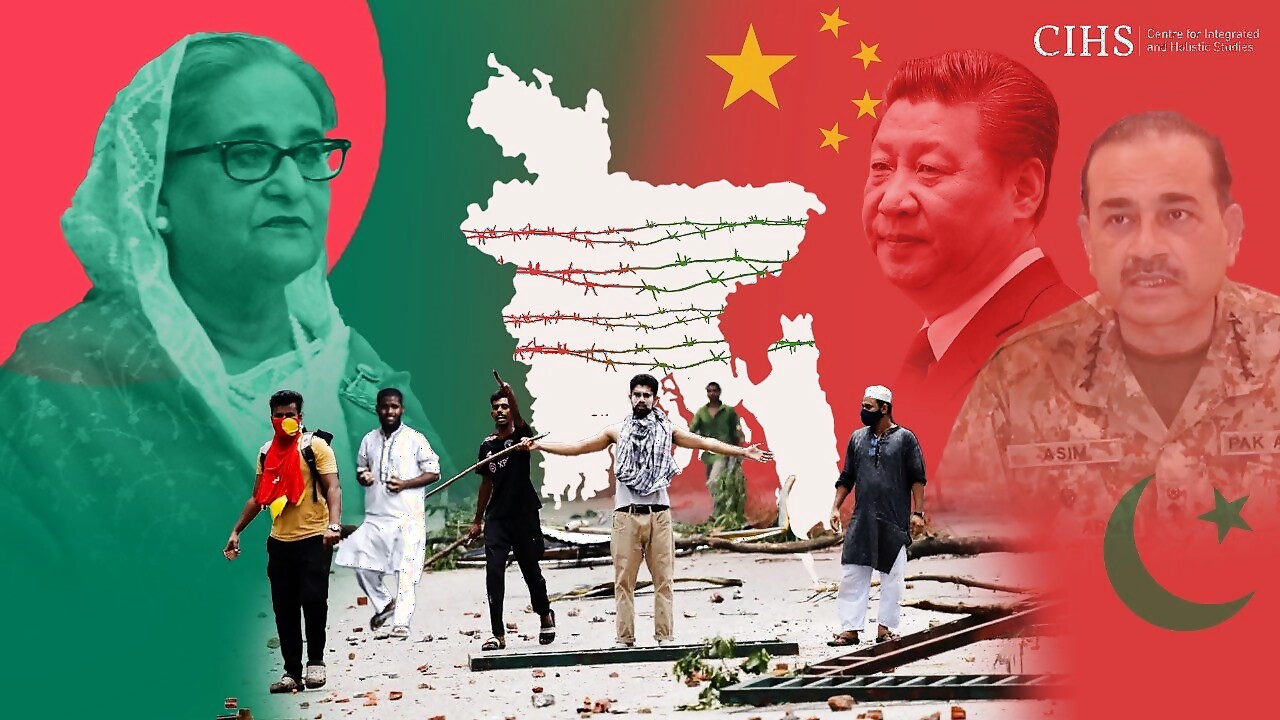
views
China, Pakistan, geo-political interest groups, and international stakeholders may have contributed to the current wave of violent protests in Bangladesh, which resulted in 130 fatalities. These players may have used the anger against quotas for government jobs to fuel dissent against Prime Minister Sheikh Hasina and her Awami League government. The recent wave of violent incidents appears to have been fueled by actions from China’s Communist Party, and Pakistan, who have taken adversarial positions towards Sheikh Hasina’s government and spread discontent.
Protests erupted after the Appellate Division of the Supreme Court decided on July 10, 2024, to maintain the status quo on the quota system intended for freedom fighters and their families for four weeks. This decision followed a High Court ruling on June 5, 2024, which declared the 2018 government circular that had cancelled the 30 per cent quota for freedom fighters’ descendants in government jobs illegal. This ruling sparked widespread anger among students and the broader population, culminating in violent clashes and a rising death toll.
Students from various universities in Dhaka united to demand quota reforms. After an initial postponement due to Eid and summer holidays, the student movement resumed on July 1 with demonstrations. Students and teachers from public universities such as the University of Dhaka, Rajshahi University of Engineering and Technology, and Jahangirnagar University were soon joined by counterparts from private institutions like North South University and BRAC University.
Under the banner of the Anti-discrimination Students Movement, they launched “Bangla Blockade” (Bangladesh Shutdown), disrupting domestic train and road transportation networks. Online activism surged with calls for “another 2018” in reference to the previous quota reform movement. Protestors’ calls for a “Bangla Blockade” intensified on July 7. As demonstrations spread nationwide and intensified on July 7, clashes with police on July 11 marked a significant escalation.
Prime Minister Sheikh Hasina’s remarks on July 14, referring to Razakars (Bangladeshis who collaborated with Pakistan during the 1971 war) during a press conference after her return from China, coupled with the ruling Awami League’s hardened stance intensified the situation. Chhatra League’s violent suppression of the protests resulted in hundreds of injuries.
The kindling for this unrest had been laid well before the court’s ruling, as flames were fanned during Prime Minister Sheikh Hasina’s visit to Beijing from July 8 to 10, 2024. The visit, intended to secure significant financial aid, ended abruptly, hinting at Hasina’s deep-seated dissatisfaction with the Communist Party of China (CPC). China offered only $100 million in financial assistance, a far cry from the initially promised $5 billion.

Adding to the discord, Xi Jinping gave Hasina very little time as Beijing proposed a controversial ten-year re-education policy aimed at countering Islamic culture and promoting Chinese lifestyles, similar to measures implemented in Pakistan in 2010. This proposal, seen as racist and a direct affront to Bangladesh’s cultural sovereignty, significantly strained relations between Dhaka and Beijing.
The protests in Dhaka quickly escalated as students and citizens voiced their dissatisfaction with the reinstated job reservation quota. This policy, initially abolished in 2018, had reserved 30 per cent of government jobs for the families of 1971 independence war veterans. The new quota system, viewed as unreasonable and discriminatory, exacerbated existing frustrations amid high unemployment and rampant inflation. Islamist groups such as Jamat-e-Islami, backed by Pakistan and funded by the Middle East via Pakistan, have significantly undermined Bangladesh’s private sector, aggravating the economic challenges the country already faces. This influence has intensified the demand for government jobs, making them even more sought after. The resulting volatility in the private sector has created a hostile environment where economic grievances easily transform into political unrest.
This destabilising influence was evident during the violent response to the Bangladesh government’s attempt to modernise labour laws in 2018. The proposed changes aimed to attract more foreign investment by aligning local labour practices with international standards. However, Islamist groups, heavily funded by Pakistan, vehemently opposed these changes, arguing that they would undermine Islamic values and worker rights. Jamat-e-Islami, with its significant political clout, mobilised large-scale protests and strikes, which paralysed many sectors of the economy, including the vital garment industry. This unrest discouraged foreign investment and highlighted the fragility of the private sector in the face of Islamist political and religious extremism.
Moreover, China’s involvement in Bangladesh’s student unions has further escalated the situation. Reports indicate that the CPC has infiltrated Bangladeshi universities through education and student exchange programmes. Five Chinese universities in Yunnan province alone teach the Bangla language and culture, sending students to Dhaka to create intelligence assets and funding channels for student wings. This strategy aims to mobilise Bangladeshi students against their own government’s policies, thereby increasing CPC’s influence.
Notably, student unions in Bangladesh that staunchly defend Islam have remained conspicuously silent on CPC policies against Uyghur Muslims. The current situation highlights the CPC’s potential to influence and organise student protests in Bangladesh. Earlier, on April 13, 2021, students gathered at the Dhaka Press Club, demanding better arrangements from the Hasina administration for studying in China. The protest, which nearly turned violent, demonstrated the CPC’s influence and capability to mobilise students in Dhaka, showcasing its broader strategy of using education and cultural programmes as tools of influence.
Moreover, the China-Pakistan nexus in Bangladesh adds another layer of complexity. Pakistani students, often affiliated with Jamat-e-Islami, collaborate with their Bangladeshi counterparts to facilitate communication and coordination for protests. The human intelligence (HUMINT) capacity of Pakistan’s ISI has been instrumental in channelling Chinese funds to stage ongoing protests in Dhaka. Bangladeshi workers in Chinese companies have reportedly been trained to mobilise pro-China rallies, as evidenced in 2019 when workers at Jingjiu Group in Bangladesh were seen chanting pro-China slogans in Mandarin.
Intriguingly, the CPC’s interest in Bangladesh extends beyond financial aid. Beijing aims to establish a strong foothold in South Asia through its Belt and Road Initiative (BRI), aspiring to integrate Bangladesh into its economic sphere. Despite the disappointing loan offer, China has committed to supporting the Southern Integrated Development Initiative (SIDI), which focuses on developing Payra Port and other infrastructure projects in Bangladesh. The recent contention with Hasina was not in China’s interests. This commitment showcases the CPC’s strategic intent to maintain and expand its influence in the region.
Pakistan’s involvement in Bangladesh’s current turmoil is deeply rooted in historical animosities. Bangladesh, formerly East Pakistan, gained independence in 1971 after a brutal war that left deep scars. Pakistan’s defeat in that war still resonates, and Islamabad’s attempts to influence Bangladesh’s political landscape can be seen as efforts to save its face and regain lost ground. This collaboration between Pakistan-backed Islamist groups and Chinese interests adds a layer of geopolitical intrigue to the ongoing unrest.
Ultimately, the current unrest in Bangladesh is a potent reminder of the fragile balance in Asian geopolitics. The protests, driven by economic concerns and exacerbated by external influences, pose significant challenges for Prime Minister Sheikh Hasina’s administration. The strategic decisions made by Bangladesh’s leadership in navigating these influences will be crucial in determining the nation’s trajectory in the coming years.
The author is Director of Research at Centre for Integrated and Holistic Studies (CIHS), a bipartisan think tank based out of New Delhi. Views expressed in the above piece are personal and solely those of the author. They do not necessarily reflect News18’s views.












Comments
0 comment